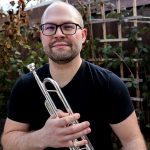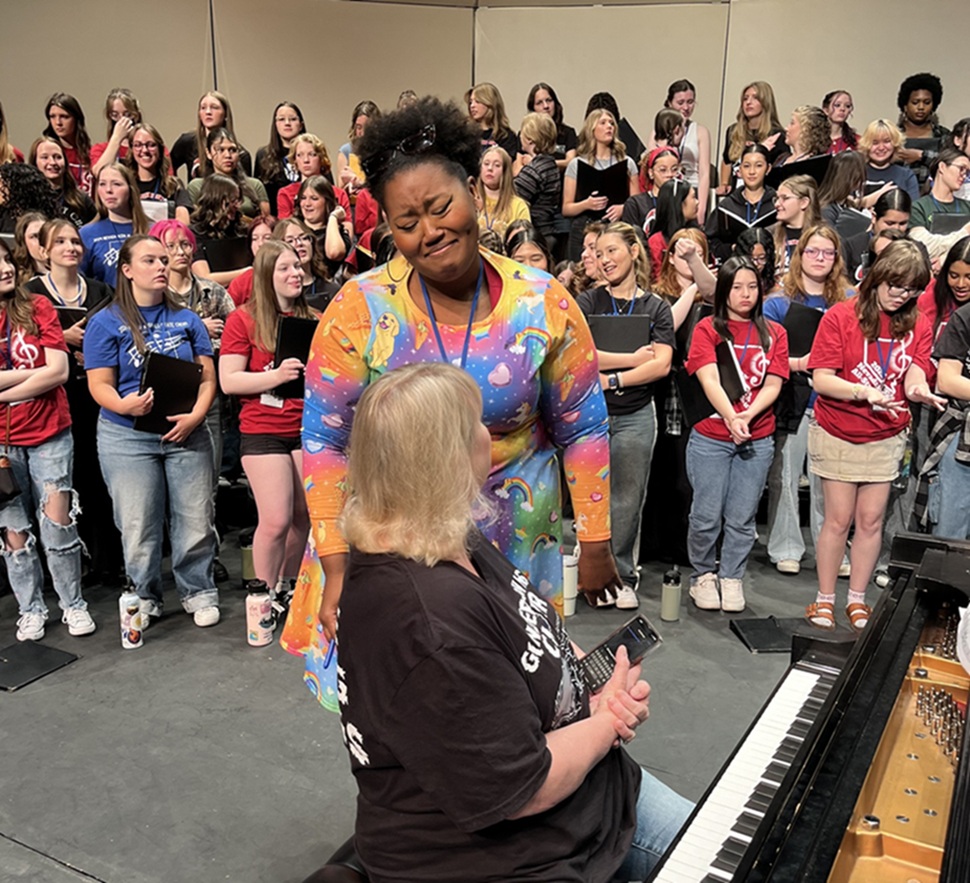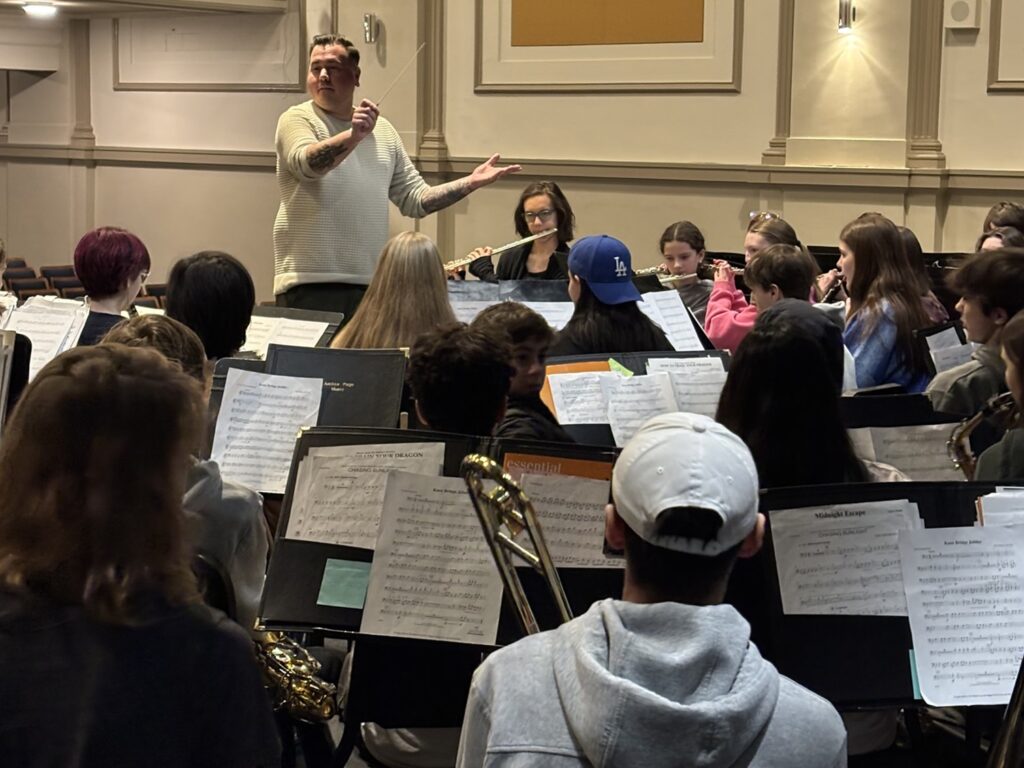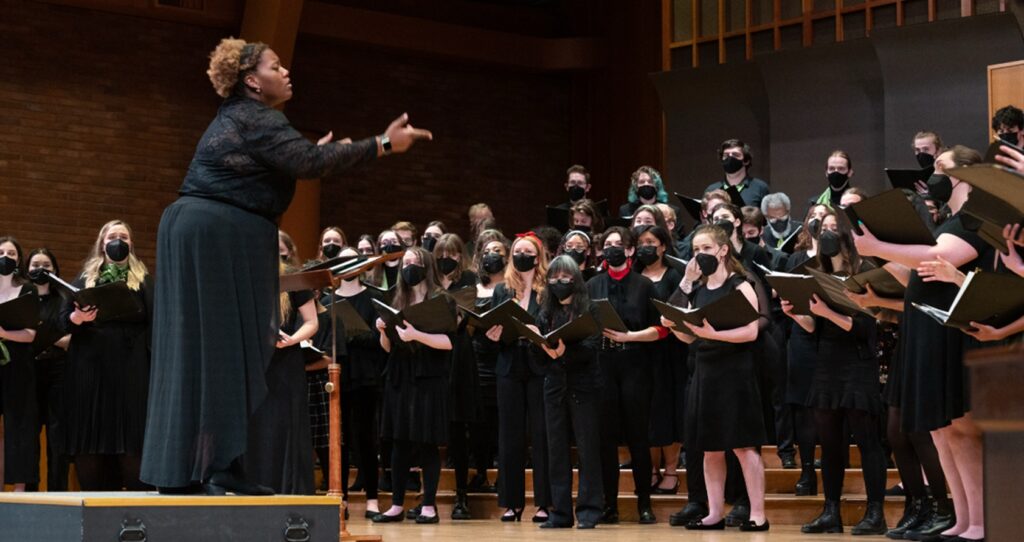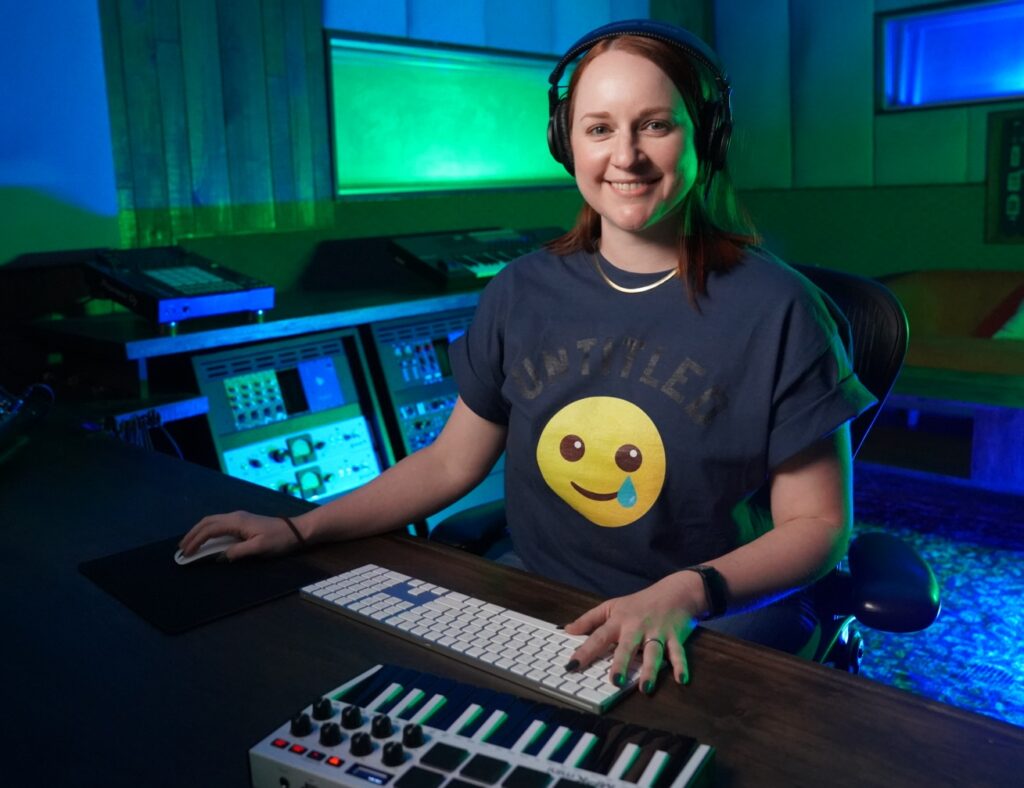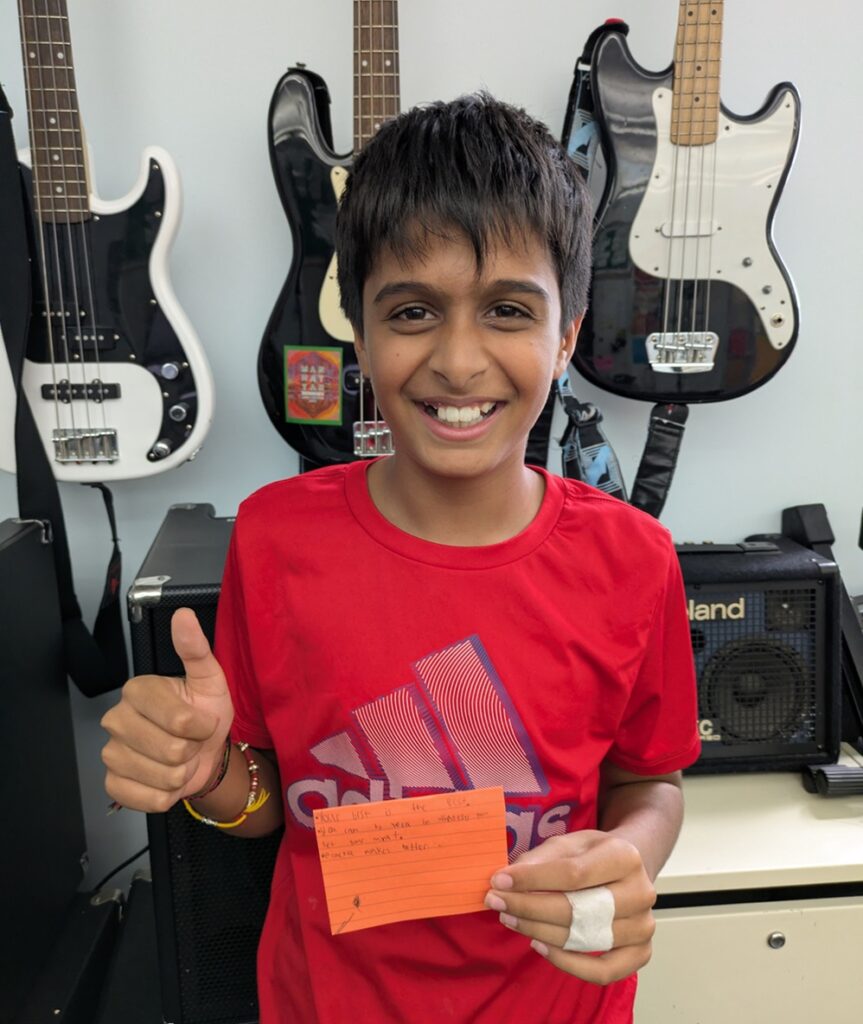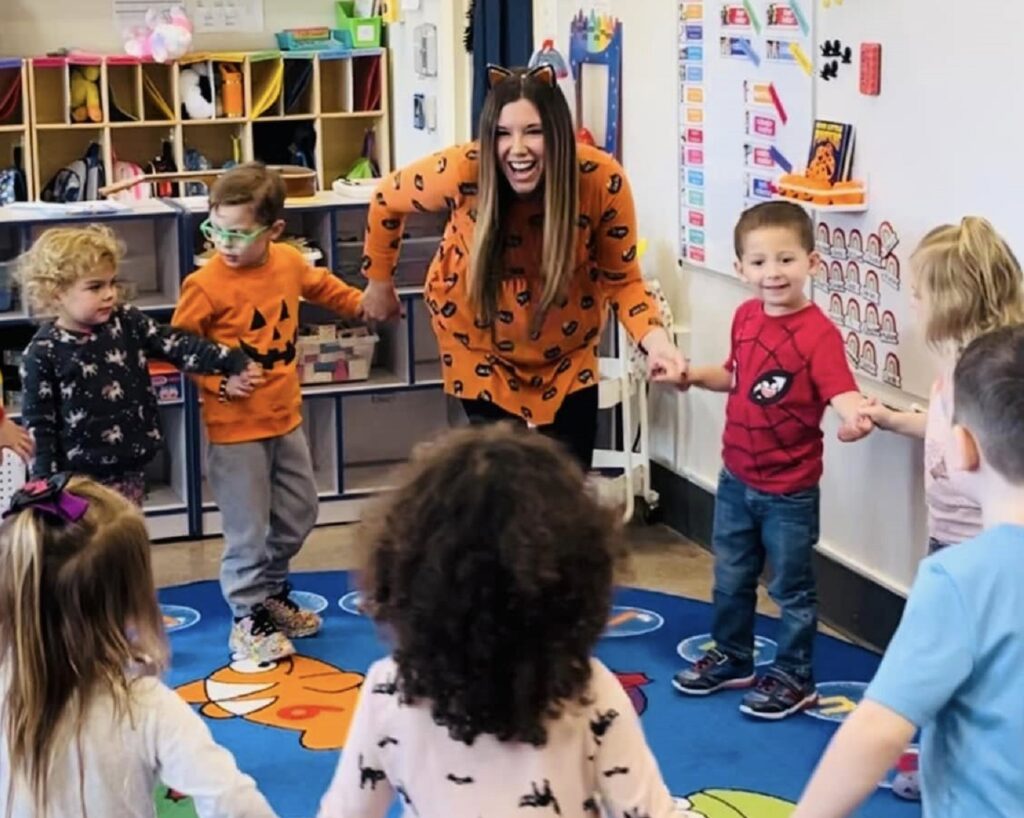Tagged Under:
Dissecting Boise State’s Mission Statement Led to Innovation
One music educator found ways to define “comprehensive” music education to help his students achieve personal goals.
Institutional mission statements, especially those in music departments/schools, tend to be both aspirational and disconnected from the actual work done by faculty as well as the curriculum they champion. In the Music Department at Boise State University, part of our mission is to provide comprehensive music education to our students. Since joining the faculty, I have worked hard to realize some of the potential behind this mission statement and our goals, and I would like to share some of the things I have done in the name of comprehensive music education for our students.
The first challenge with our mission statement is in how we characterize and define “comprehensive” when it comes to music education. As a discipline that is centered around the performance of established repertoire, it’s no surprise that music in higher education is especially resistant to any form of change or innovation. As such, we could rationalize that “comprehensive” encompasses the skills and repertoire that music and secondary music education is focused around. This is a reasonable assumption given the narrow range of content and lack of scope represented by music curricula at your typical institution. For the purposes of this article, “comprehensive music education” should be treated as the range of skills and experiences that equip students for a wide range of careers in the music industry that still include the traditional performance route.
I will highlight three specific things that I have worked on in the past seven years, and how they have had an impact on our students and contributed to our mission statement of “comprehensive music education” as well as how they have helped to address the repertoire-bound challenges faced by your typical accredited institution.
- Boise State’s new music production certificate
- A collaboration with our local music festival, Treefort Music Fest
- New possibilities for the final project in our Bachelor of Arts degree
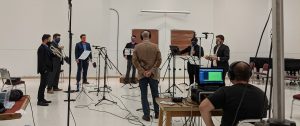
At the onset, I must first highlight one aspect of my department that is both atypical and advantageous to the work I have done: our lack of a jazz-specific degree path and department. Unlike most traditional programs, Boise State has not yet established the typical structures that isolate areas of the Music Department from each other. Put plainly, we don’t have a jazz department that would naturally be at odds with the classical department. As a result, there are no administrative or degree-level barriers between students and jazz/commercial music experiences (other than a student’s credit load and other external factors). This has opened the door to a more flexible approach to the nature and goal of our jazz ensembles and courses, one that I have been able to leverage in the service of comprehensive music education. The challenge with our current setup is simply that jazz courses are purely elective within our degree sequences.
Music Production Certificate
The new certificate in music production will launch in fall 2023. This seven-credit certificate teaches the foundational skills of creating, manipulating, processing and recording music in the modern music industry. The certificate’s three courses are open to anyone in any degree field, does not require traditional music literacy, and can be completed in three semesters. They fit easily within the elective requirements of nearly any major and stands to enhance post-graduation outcomes for nearly any degree. Skills in music/sound production can translate to nearly all parts of the music industry, and I treat music technology as a vital and all-encompassing part of comprehensive musical training.
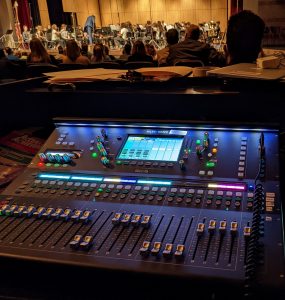 The first step in developing this certificate was drafting and justifying my home department’s needs and resources — a multiyear process that highlights the tremendous inertia that resists change in music departments. My biggest challenge during this phase was getting everyone to vote on the proposal rather than just discuss it into oblivion. For two years, I missed our curricular proposal deadline before getting it done in time. In order to get it to a vote, I not only had a complete draft of the proposal, but I also had commitments for resources from within and outside of the department. A crucial piece of support was from the School of the Arts and the dean’s office that oversee our department. I was promised resources for this specific project, resources that my department spent time discussing how to reorient toward other projects.
The first step in developing this certificate was drafting and justifying my home department’s needs and resources — a multiyear process that highlights the tremendous inertia that resists change in music departments. My biggest challenge during this phase was getting everyone to vote on the proposal rather than just discuss it into oblivion. For two years, I missed our curricular proposal deadline before getting it done in time. In order to get it to a vote, I not only had a complete draft of the proposal, but I also had commitments for resources from within and outside of the department. A crucial piece of support was from the School of the Arts and the dean’s office that oversee our department. I was promised resources for this specific project, resources that my department spent time discussing how to reorient toward other projects.
Once the proposal was approved, I inputted all the proposed changes into our university curriculum system and answered any questions or challenges that came through the multipart approval process. This took the better part of a semester, but it was eventually ratified. Once ratified, it was time to get to work designing the courses and putting the committed resources into play.
I spent the next semester serving double duty to get everything in place for the certificate, including finding space, creating budgets, getting software certified, working on a website for the certificate, drafting language and syllabi, and figuring out who was going to teach which course. In a sense, I inherited an additional area of responsibility outside of trumpet and jazz. This hard work was well worth it as we are in the home stretch before this certificate is launched.
Treefort Collaboration
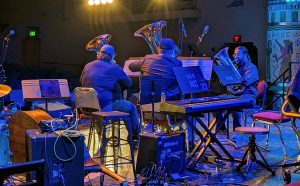 The second way that we have supported Boise State’s comprehensive music education mission is through our community partnership with TreeFort Music Fest, a massive music festival that hosts more than 500 bands in Boise (less than one mile from campus) each March. This is primarily an indy-music festival but has expanded with various other “forts,” such as food/beverage, art, literature, wellness and everything in between.
The second way that we have supported Boise State’s comprehensive music education mission is through our community partnership with TreeFort Music Fest, a massive music festival that hosts more than 500 bands in Boise (less than one mile from campus) each March. This is primarily an indy-music festival but has expanded with various other “forts,” such as food/beverage, art, literature, wellness and everything in between.
In the past few years, Boise State has become the signature sponsor for TreeFort, and there are many departments on campus that host their own “fort.” Oddly, the Music Department has not been part of the festival even though TreeFort is first and foremost a music festival.
This year, I approached the director of TreeFort about having a Boise State Music Showcase stage. He asked for a proposal, so I got to work. Much like the music production certificate, I brought this to my faculty meeting. This time, it was met with instant approval. The only catch was that I was on deck to put the whole thing together — and the festival was during our spring break! Nevertheless, I went to work because this represented an amazing opportunity for our students to perform as part of an international-level event as professional musicians.
One of the stipulations from TreeFort was that all the music had to be original. This might seem easy to accomplish, but it posed some problems for a discipline that is defined by the established repertoire that determines ensemble size, type and nature. It turns out that we have loads of students who write and play their own music. I learned that this type of underground music-making exists in nearly every music school, but it just doesn’t have much of a platform to emerge. Students jumped at the opportunity for their music to be supported by the department in an official capacity.
After getting student ensembles interested in performing at the festival, I was able to get a rough idea of how long their sets would be. Then I asked for faculty volunteers to act as producers for each group, and I would serve as the musical director and presenter. This setup worked well as I could focus on the production and marketing end while my colleagues helped to ensure the musical product would be at its peak.
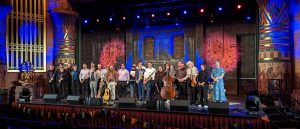 Throughout the next semester, I gathered technical needs from each ensemble, scheduled photo shoots and wrote marketing pieces. The week of the festival, we loaded the gear on a flatbed truck that we borrowed from the theater department and went down to the Egyptian Theater for the show.
Throughout the next semester, I gathered technical needs from each ensemble, scheduled photo shoots and wrote marketing pieces. The week of the festival, we loaded the gear on a flatbed truck that we borrowed from the theater department and went down to the Egyptian Theater for the show.
With me acting as liaison between the house sound and lighting crew, we set up and finished our sound check in 40 minutes. This is as professional of an environment as it gets! The show went off without a hitch, the students performed marvelously, and they loved the experience.
For many of the students, this was the first time a performance was all about them and what they do. There were no grades, no coaches on stage, no agenda, just an audience and the spotlights. The artistic content was 100% on the students, and they seized the day! I’ve always claimed that students are ready to go out on the stage; they just need to be shown the door, and this event proved that.
Final Project
The finishing foundations requirement for our Bachelor of Arts degree is the third way that we have supported the school’s mission statement of offering a comprehensive music education. Students have the option of presenting a final recital or a final project. In the past, the students who have chosen the project are typically more interested in non-performing careers in music or have a specific research interest. Their final projects end up being a paper, research project or something like that.
In my third year at Boise State, I was appointed as an advisor for the BA pathway and I have encouraged students to leverage the final project in a way that will propel their future careers in some way. This has resulted in websites, recording projects, electronic music albums, internships and large-scope recital projects.
Music in higher education is still very repertoire-driven, which is reflected in the fact that solo recitals still exist as a major part of music degrees. Hardly anyone needs to give a solo recital of traditional music on their instrument as a part of their career (save for maybe college professors). Nevertheless, a solo recital does require you to demonstrate performing skills and accomplishment on your instrument.
I would comment that there are plenty of ways to show these skills and that students should be showing them on a regular basis for audiences rather than as a single part of a finishing foundations course. But I digress.
I want to highlight two specific BA projects that my students accomplished.
Anthony Taylor is primarily a drummer, but he was interested in metal music. Throughout the semester, he composed and recorded a full album of metal music in which he sang and played bass, drums and guitar. I helped him gain the recording skills necessary to plan/manage his project. Anthony did the majority of the work, and essentially learned how to be a popular music producer from the ground up. He stated that the biggest barriers to his project were on the technical side rather than the music or artistic. Anthony also identified that exactly 0% of the curriculum in his degree prepared him for those technical demands, nor did he have any opportunities to play the music he ended up recording and producing as part of his degree pathway. There was a striking disconnect between his music degree, his interests/projects and the career path he ended up pursuing.
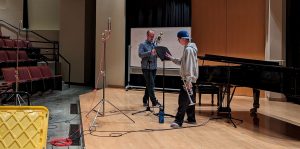 The second BA project was for Chris Woods, a trumpet student of mine. I asked him, “What is one thing that you wish you could leave here having done that will help you with your career?” His answer: to record a solo trumpet album. Hardly anyone his age has a solo album, and it is something that could set him apart in his field. Furthermore, recording an album has so much more value than a one-and-done recital that you likely won’t want to use or save for any reason (such is the culture in music performance). I helped Chris plan out his album and repertoire. Then I talked him through what the process would look like if I was the producer/engineer and he was the soloist. He arranged rehearsals, booked spaces, marked up scores and prepared his music. As a producer, I set up the recording sessions and did the mixing and mastering. Throughout the process, I helped Chris understand the vocabulary, expectations and process that an artist would go through when recording a solo album. This was an invaluable experience for him. The first time he is recording a solo album on his own in the professional world won’t be the first time he has gone through the process. This album is set to be released on Spotify and be presented in our undergraduate research showcase this spring.
The second BA project was for Chris Woods, a trumpet student of mine. I asked him, “What is one thing that you wish you could leave here having done that will help you with your career?” His answer: to record a solo trumpet album. Hardly anyone his age has a solo album, and it is something that could set him apart in his field. Furthermore, recording an album has so much more value than a one-and-done recital that you likely won’t want to use or save for any reason (such is the culture in music performance). I helped Chris plan out his album and repertoire. Then I talked him through what the process would look like if I was the producer/engineer and he was the soloist. He arranged rehearsals, booked spaces, marked up scores and prepared his music. As a producer, I set up the recording sessions and did the mixing and mastering. Throughout the process, I helped Chris understand the vocabulary, expectations and process that an artist would go through when recording a solo album. This was an invaluable experience for him. The first time he is recording a solo album on his own in the professional world won’t be the first time he has gone through the process. This album is set to be released on Spotify and be presented in our undergraduate research showcase this spring.
Be an Innovator
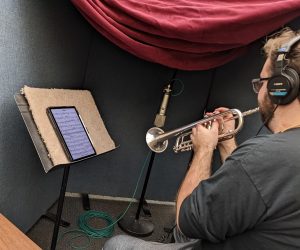 I hope that my experiences have served to inspire and inform you. I encourage everyone to innovate in music despite how challenging it can be in our field. In music we not only resist innovation, but we actively teach students to NOT innovate. This is a major hurdle for us in higher education. We must retain that which enhances music careers and add that which enables them.
I hope that my experiences have served to inspire and inform you. I encourage everyone to innovate in music despite how challenging it can be in our field. In music we not only resist innovation, but we actively teach students to NOT innovate. This is a major hurdle for us in higher education. We must retain that which enhances music careers and add that which enables them.
I know it can be hard, and sometimes it may seem hopeless. The additional workload can seem unfair, and it would be easier to just stay in your lane and support the status quo. However, this latter option leaves our students out in the cold.
The key to progress is within the tenets of strategic planning. Pick apart your school’s mission statement and strategic plan. Figure out what it means in the terms of your discipline, and then measure every action you take against that metric.









